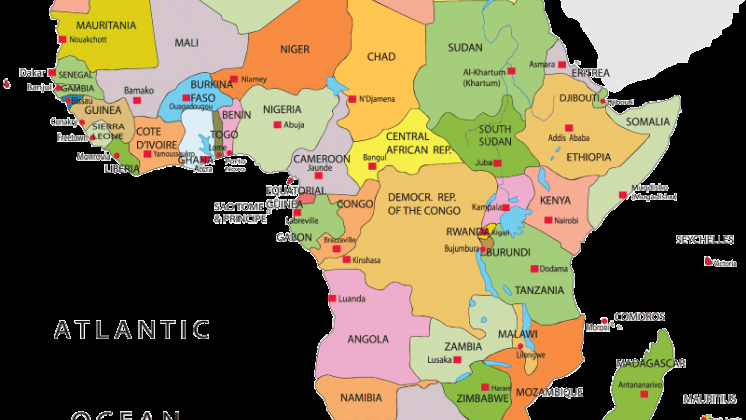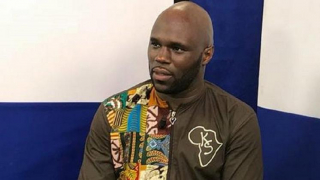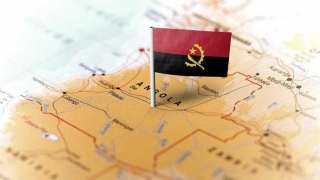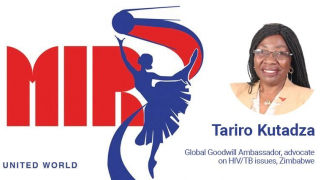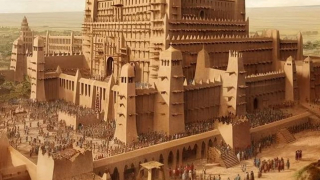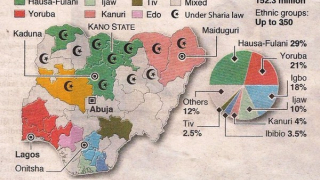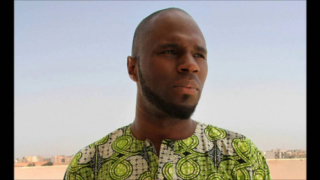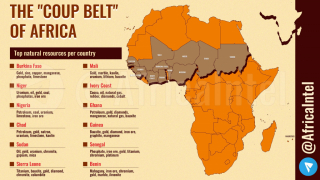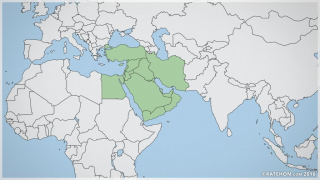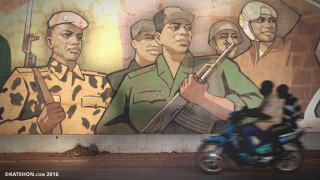Africa: Results of 2017 and Prognoses for 2018
15.01.2018
Before we can conduct an analysis of the situation in individual African countries, we should remember the so called ‘Marshall plan’ for the region. The proposition for the creation of the project came in January 2017 from the German minister for economic cooperation, Gerd Müller. This is about the EU and Europe being ready for a new colonisation of Africa.
This is mainly related to the plans of the Club of Rome, which deals with global planning. What is more, the possibility of the launch of a Continental Free Trade Zone by the African Union is under discussion. Seeing as Africa is not participating in such important treaties like the Transatlantic Partnership on Trade and Investment, in which the US get the most important preferences, Germany is planning to get to the continent earlier through the EU.
Interests are related to the fact, that many African countries reached a yearly economic growth of 5%. The region is of interest to the West in the area of natural resources as well. Taking into account the fact, that the continent’s population will grow to 2,5 billion people around 2050, new jobs will be necessary as well.
However, not just the US and the EU have ambitious plans for Africa, but China as well. 2018 is promising to be rich in events: economic treaties, diplomatic breakdowns, and possibly coups d’état as well.
Gambia, Senegal
The year began with a coup in Gambia and ended with a coup in Zimbabwe. These two events are the most noticeable ones from Black Africa.
The reasons for the coup in Gambia are not fully clear and more subjective than objective. Yahya Jammeh ruled for a fairly long time and had long searched for support from Khaddaffi and China. Lately, however, he made a sharp turn towards Turkey and Erdogan.
For some time, Gambia was the main Turkish outpost (at least in Western Africa). The Jammeh regime was considered to be fairly durable and stable. A coup attempt in 2015 had failed, which is why it is all the more surprising that Jammeh took second place in the presidential elections. And even though Adam Barrow (who had taken second place) did not manage to get 50%, a second round was not begun. Jammeh did not want to go.
As a result, 8 African countries (mainly Senegal) entered their troops, removed Jammeh, and put Adam Barrow in power, who is most likely supported by globalist groups: the same ones that supported Clinton and Obama. What is more, the state treasury was emptied: while fleeing to Equatorial Guinea, Jammeh took what little was left with him.
This is why Gambia, which is the smallest African country, has fallen into poverty. Nothing good is waiting for it in the future. This is the beginning of 2017.
It is also important to note, that Gambia has entered the Commonwealth of Nations again in 2017. In 2013, former president Yahya Jammeh left the bloc on the background of worsening relations with Great Britain. Adam Barrow, the new president, has worked as a security guard in London at the start of the 21st century and reinstated the country as member of the organisation.
Zimbabwe
We can consider the end point to consist of the events that took place in Zimbabwe in November. After Zimbabwe’s defence minister (Chiwenga) made a trip to China, the Chinese approved an operation to overthrow Mugabe, who has ruled the country for 37 years (from 1980 to 1987 as prime minister and from 1987 onward as president). The Chinese always supported him, but later decided to replace him with people from his own team, i.e. with his comrade in arms and former vice president Mnangagwa and with veterans from the liberation war.
In fact, a castling took place within the team: Mugabe and his wife were removed alongside the clan of young specialists (the ‘youth movement’) that was related to them and of so-called technocrat ministers, which were replaced with Chinese help by military veterans. Why is a complex question. It is possible that there was some kind of agreement between China, the US, and the EU about the change: Mugabe replaced in exchange for rapprochement on the Korean question. Other variants are also possible.
The fact is, that the Chinese have shown that they can also organise colour revolutions. This is very important and will have meaning in 2018.
We will especially note the preferential treatment that Mugabe managed to receive after his departure. Until the end of his life, he is allowed 20 bodyguards and servant staff, the right to own large manors, the right to construct a palace in any part of the capital and a private home anywhere in the countryside, a ‘Mercedes’, and also the right to four flights a year on a private plane. What is more, Mugabe’s birthday on 21 November will be a state holiday. This is not the first example in all of history of the overthrow of a head of government by his own comrades in arms. But it is unlikely that anyone will dare to say that Mugabe didn’t earn all this through his life and work.
Guinea
In December 2017, Guinea declared that a mercenary coup had been averted. The mercenaries had planned to attack president Theodore Obiang Ngema, a political long-liver in the African region.
In his radio address, security minister Nikolas Obama Nchama said, that radical oppositional parties were involved in the affair and that the coup was averted in cooperation with Cameroonian security services. This happened after Cameroon’s arrest of 38 armed men at the border on the 27th of December. Two days later, Guinea’s ambassador to France Oyono Ndong Mifumu called the incident “an attempted incursion and destabilisation”.
The suspects were found to be in the provision of missile launchers, rifles, and ammunition. Obiang himself is scared that a “war” is being prepared against his regime, as he “has spent a lot of time in power”.
A potential coup will be a real threat for Obiang in 2018. The last serious attempts to overthrow the leader were undertaken in 2004 (apparently with British funding). Guinea is one of the largest sources of oil in Black Africa, although more than a million citizens live under the poverty line.
Kenya
Kenya went through a long crisis when a situation from nine years ago repeated itself: a conflict between current president Kenyatta junior, who is backed by China, and his eternal competitor Odinga, who was and is supported by American clans related to the Democratic party. After the results of the presidential elections were declared void, the next line of destabilisation took place. We note, that in August ruling president Uhuru Kenyatta held on to victory; however, despite the high turnout, the Kenyan Supreme Court declared the results of the voting to be void. That same August, disturbances resulted in the death of a minimum of 24 people.
We can characterise the organisation of government in many African countries as potestarity: a special kind of government that is based on distinctive forms of rule and which does not fit the Western conception of democratic institutions and the division of power.
Uhuru Kenyatta (the son of Jomo Kenyatta, the first president of Kenya after independence from 1963 to 1978) became president in 2018.
Raila Odinga, former prime minister and now the main opposition politician and leader of the Orange Democratic Movement, is further disturbing the already unstable situation. He is also not independent: ‘thanks’ to him Zimbabwe and other countries that were targets of Washington were attacked. In 2008, it was he who called on the African Union to hold an extraordinary meeting to decide whether or not to send troops to Zimbabwe. He declared, that if it was impossible to collect troops, the African Union should allow the UN “to quickly send its forces into Zimbabwe, so they can take control over the country and give humanitarian aid to the population, which is dying from cholera”.
It is telling, that resigned Secretary of State John Kerry appeared in Kenya and schemed with Odinga. But nothing came from this: there was a massacre with several tens or hundreds killed and elections were re-held twice, which were won by Kenyatta junior the third time around. In general, after these events Odinga’s resistance crumbled. China defended its positions once again. The country is building a base in Djibouti. There is now a joint Japanese-American-Italian base in one part of the country and a Chinese one in the other. This is very interesting, because Djibouti is a miniscule port state that plays a critical role in any sea communications. And we see the penetration of Chinese imperialism even further into Africa and the growth of Japan’s maritime ambitions; the latter is quickly developing its navy. We note, that Donald Trump’s policy is more and more going into the direction of a transfer (for economic purposes) of part of the USA’s ‘police’ functions in the world oceans to Japan.
In case of a potential new wave of destabilisation in Kenya, the neighbouring regimes will suffer as well: Uganda, South Sudan, and Rwanda. First, this might take shape in the form of a potential break-off of economic ties (the port of Mombasa supplies these countries with goods and food); second, it might create a fragile civil situation, which means civil wars, local conflicts, and attacks of ‘Al-Shabab’ terrorists.
Thus, the Kenyan elections will be a pretext for foreign interference in the country’s affairs. Kenyatta has already managed to accuse the British government of an attempt to predetermine the outcome of the elections and warned, that any contact with his administration will have to be made remotely.
And even though Kenya has been an ally of Washington and London for a long time (as a minimum in the war in Somalia), Kenyatta is now not putting up with the Atlanticists, which has resulted in diplomatic pressure, foreign finances for the opposition, and, of course, corresponding coverage in Western media.
All signs point to long lasting consequences for the elections, not just for relations between Kenya and Western governments, but also in the relations between Western governments and the rest of the African continent. Many see the fate of Kenya as a key indicator of stability in the region.
The elections will also influence Kenya’s decision on Somalia. If Odinga insists on Kenya leaving AMISOM, Kenyatta considers it necessary to enlarge the country’s role. The problem of so-called ‘Somaliland’ remains painful: Odinga is calling for the acknowledgement of the self-proclaimed state. If that happens, Kenya risks ruining its relations with the rest of the African Union, which is very scared of the rise of separatist currents on the continent. However, this call is seen as fantastical, seeing as not one government in the world has de jure acknowledged ‘Somaliland’ in its 24 years of existence.
Liberia
The next country worthy of attention is Liberia. There, a critical situation lasted to the very end of 2017. George Weah, the world’s best footballer in 1995, led in the first round. He is backed by former president Charles Taylor (1997-2003), who has been demonised in the West as a maniac and cannibal. He is now in a prison in The Hague and controlling Weah from a distance. The sportsman won the first round, and for a long time it was unclear if the elections would have to be repeated.
At present there is a confrontation between Weah and Joseph Boakai. The latter is the globalist’s candidate from the Obama-Clinton and World Bank cohort. The third round of the elections was held on the 26th of December, and Weah won with a landslide by taking 61,5% of the vote and coming first in nearly all of the country’s electoral districts. He has already taken the honorary title of ‘son of the people’ (the title of ‘father of the people’ will likely come to silently mean Taylor). Weah’s victory in a country that was created by US efforts and was run for nearly two-hundred years from America is very impressive. It is evidence of the deep irritation of the liberals of the neoliberal economic course that was dictated by the IMF from 2006 onwards. This is the first case in world history where a footballer has become president of a country, and is speaks volumes of the continuing wave of ‘populism’ that is so feared by the mondialists.
In general, if we tally up the results in Black Africa, we will notice that both the character of the coup in Zimbabwe, George Weah’s victory, and Uhuru Kenyatta’s holding on to power are all evidence of a defeat for the forces of global capitalism. They can only name the coup against Jammeh in the smallest country of continental Africa as a victory, and even that will only be a small comfort to them.
South Africa
We can also observe significant changes in South Africa. President Jacob Zuma was under real threat of impeachment, although officially his mandate only ends in 2019. At the end of December 2017, the country’s Supreme Court decided, that in accordance with the current legislation the parliament does not have the right to hold him accountable for a corruption scandal.
On the one hand, the court has protected the president from an incoming impeachment. On the other, it has given the parliament the possibility to create an easier procedure for the future.
The president can be held accountable only if it is determined that his actions have led to a ‘serious breach of the constitution’. The problem is, that at the current moment there is no clear definition in the constitution of what a ‘serious breach’ is, and the court has allowed the parliament to begin solving this question. It also explained, that if the parliament executes the procedure according to the rules, the speaker can begin an impeachment procedure.
Zuma faced a whole series of scandals and accusations, and in 2016 mass protests took place. They were mainly based on the fact that the president had spent government money on a renovation of his personal domicile.
There are also American interests in South Africa. The country’s main economic sectors are resources (minerals, gold, metals etc.), agriculture, and a fairly well developed financial market (despite the crisis, the Johannesburg Stock Exchange (or JSE) remains one of the 15 largest in the world).
But it is interesting, that despite strong trade contacts with the US, South Africa under Zuma sometimes manages to ignore the ‘Washington consensus’: for example, during voting in the UN Security Council about a proposed US resolution on Syria, South Africa abstained from voting. The country’s ambassador said, that the project would not facilitate a peaceful solution to the crisis.
In general and despite the corruption scandals, Zuma tries to follow an independent policy on the international level and is aimed at strong cooperation with other BRICS members (mainly with China and Russia).
Because of these moments and Zuma’s attempt to independently solve the country’s domestic problems, the US are supporting the opposition in the country. Structures from the project Democracy Works, which is financed by the American NED fund, were activated in the protests. The SWOP Witwatersrand liberals in Johannesburg, who cooperate with Gene Sharp’s (the father of colour revolutions) Albert Einstein Institute, also took active part in preparing the protests.
This is why we cannot say that the protests were fully spontaneous.
We can expect, that in 2018 the court’s decision will simplify the parliament’s aim of removing Zuma from his post before his term is up. Cyril Ramafoza, who will probably become president, is a businessman linked to transnational corporations. He is one of the wealthiest persons in South Africa and owns the local branch of ‘McDonald’s’. He is also part of the board of directors of the country’s branch of the ‘Coca-Cola Company’. This is why it is clear, that the election of such a leader will cast doubts upon South Africa’s sovereignty.
Nigeria
Nigeria did not manage to solve the problem of terrorist organisation Boko-Haram in 2017. In addition, fighters of Christian separatist organisations are active in the Niger delta. In particular, in February 2017 pirates captured a craft with a Russian and Ukrainian crew.
The activation of separatists in the region of the former unrecognised state of Biafra (the south-eastern part of Nigeria) is linked to the fact that the current president, Mohammadu Buhari, is a Muslim who represents the country’s internal regions, while the oil producing regions are settled by Christians.
Mali
On the 18th of November 2017, the bloodiest act of terror in the history of the country took place in Mali. During an attack by terrorists linked to the organisation ‘Al-Qaeda in the countries of the Islamic Maghreb’ (an organisation forbidden in Russia) on a military base in Gao more than 77 people were killed. The attack was carried out by fighters from the organisation ‘Al-Murabitun’, an Islamic group that mainly consists of local Tuareg. In 2012, the city was one of the centres of the Tuareg separatist movement that declared the creation of the Free State of Azavad and its capital to be Gao. In 2013, a French intervention removed the Tuareg from the city.
France sees Mali as an important strongpoint in the region. Immediately after his election, president of France Emmanuel Macron visited the French troops in Gao. At the current time, there are a 1000 French soldiers in the country.
Parliamentary elections are slated to take place in 2018. It is likely that France will keep its determining influence in the country.
Burkina Faso, Niger, Chad, and Mauritania (the Sahel area)
The French troops in Mali are part of the 3000-man Barkhane unit, which is deployed in 4 more Sahel countries: Burkina Faso, Niger, Chad, and Mauritania. Its main declared goal is to combat extremists.
On the 13th of August 2017, terrorists attacked a restaurant in the capital of Burkina Faso of Ouagadougou. 19 people were killed, among which were 10 foreigners. ‘Al-Qaeda in the countries of the Islamic Maghreb’ is suspected of committing the attack.
All of the countries are in the French sphere of influence; however, US special forces elements that are subordinate to US African Command (AFRICOM) are active in the region.
At the end of February, president Emmanuel Macron visited Burkina Faso, Cote d’Ivoire, and Ghana. The last of these countries had not been a French colony and it is the first time that a French leader has visited it. During the visit, the president rhetorically emphasised that he is not furthering Parisian neo-colonial interests; however, he criticised not one of the mainstays of French domination in its past West-African colonies: the CFA Franc (a unit of currency), the French military presence, and the dominance of French capital.
On the 4th of October 2017, during an attack by militants from ‘Islamic State of the Greater Sahara’ four Americans were killed during a joint patrol with security forces from Niger. The incident marked the American military presence in the region.
On the 5th of August 2017, a referendum about changes to the constitution was held in Mauritania. The flag and anthem of the country where changed, and the Senate was abolished. In general, the changes had an Islamist character. The senate was replaced by local councils that are to solve conflicts by way of Sharia law. The ombudsman and the supreme court were also fused to the Islamic High Council by wat of a ‘High Fatwa Council’. However, the government failed to hold a referendum about the re-election of president Mohamed Ould Abdel Aziz failed because of mass protests.
Sudan
Mass starvation and civil war were the order of the day in Southern Sudan in 2017.
At the end of 2017, Sudan sent a signal about intensified cooperation with Russia. In November 2017, the country’s leader, Omar Bashir, visited Sochi and met with president Vladimir Putin.
Sudan is very worried about energy issues and is at risk of losing its water supply. As became clear after an official declaration about Bashir’s meeting with Putin, the mining of gold and several other resources, cooperation with ‘RosAtom’ (to replace hydropower) and, which is very surprising, the construction of a naval waystation in the Red Sea were all discussed. Sudan only has one port with the Red Sea named Port Sudan, and it is quite small. Discussions were held about not just Egypt, but Sudan as well providing such a place to the Russian fleet.
The Sudanese leader, who is wanted by the UN court in The Hague and who is under sanctions from the US, supported Russia’s actions in Syria and requested protection from the US. The parties reached an agreement about cooperation in the oil sector, agriculture (the fertile Nile Valley allows Sudan to secure food for itself and for other countries), and atomic energy.
The country is also interested in deliveries of Russian armaments and is ready to supply Russia with a military base near the Red Sea.
Khartoum also strengthened its cooperation with Ankara. During a visit by Recep Erdogan in December 2017, both countries reached an agreement about the creation of a Turkish military base on the Red Sea. Turkey received the right to restart work on and use the port island of Suakin in the north-east of Sudan for military purposes.
For many years Sudan was a key ally of Saudi Arabia in the region and provided manpower for the war in Yemen. However, on the background of Riyad’s rapprochement with Washington, the latter of which has separated the country in two and created the unviable state of South Sudan on its territory, Khartoum has decided to look for new allies. The Saudis are scared that Qatar and Iran might become just that.
Ethiopia
In 2017, construction was finished on the Addis Abeba-Djibouti railway, which was built in cooperation with China. Thus, China has received the opportunity to move resources from Ethiopia through the port of Djibouti and to penetrate deeply into the African continent.
In August 2017, 60% of the Great Ethiopian Dam on the Blue Nile was finished. If the project is successfully concluded, Ethiopia will turn into an exporter of electricity. However, the construction of the dam can lower water levels in the Nile, which will influence food security and access to drinking water in Egypt and Sudan, and this could cause conflicts between those countries and Ethiopia.
The countries in the Horn of Africa (Somalia, Djibouti, Eritrea): an area for bases
In 2017, the first Chinese military base outside of China appeared in Djibouti. There are already American, French, and Japanese military bases in the country, as well as a Qatari peacekeeping unit. Saudi Arabia announced its plans to build a military base in Djibouti in 2017 as well. The local government has welcomed Riyad’s decision.
In Ethiopia and Eritrea, possibilities to open a Russian military base in Eritrea were discussed. Such a possibility in the future is not excluded by Donald Yamamoto, a State Department civil servant who held a speech in Addis Abeba in 2017. There were no official declarations from Russian and Eritrean officials on the matter.
The UAE and Saudi Arabia are currently using the Eritrean port of Assab during the war in Yemen.
On the 30th of September 2017, Turkey opened its largest military base abroad in Somalia; it will have support capacity for around 1000 soldiers and officers. It is thought, that they will train up to 10 000 Somali soldiers for the fight against terrorists in this riven country, which has been captured by terror and fear.
The importance of the Horn of Africa and Sudan for control over the Red Sea and the seaway leading from the Indian Ocean to the Mediterranean has grown on the background of the Chinese ‘One Belt, One Road’ initiative, which was declared in 2017 and whose maritime part follows precisely this route.
As it appears, 2018 will be marked by continued Islamist attacks in Somalia. Against the background of the latest events in Yemen (the killing of Saleh and the defection of Salehites to the Arab Emirates), we can expect a sharp escalation of the situation in the entire region: in Somalia, Djibouti, Ethiopia, Eritrea, and, to a certain degree, in Sudan. It is likely, that the number of military operations will increase and will be inseparably linked to events on the Arabian Peninsula, because now already the Arab Emirates practically have a base in Southern Yemen and on the islands between Yemen and Africa (and in Africa itself on the territory of collapsed Somalia, with a view to expand into Djibouti). The Arab Emirates already have a base in Eritrea, a narrow and poor coastal country that was artificially created in 1993.
In principle, we can expect that this will even be of use to the Kremlin. Russia is currently strongly cooperating with the Emirates, which are considered a more stable partner than Saudi Arabia. They receive arms and serious contracts are signed with them. The Emirates are seen as more moderate and reasonable partners, and it is likely that with the help of Russia they will try to increase their influence in this part of Africa.
Mozambique
In October 2017, an Islamist uprising flared up in the province of Kabu-Delgadu in the north of the country, which is inhabited by the Makua and Makonde peoples. The Islamists, who just call themselves “Sunni”, are fighting for the creation of an Islamic state in Mozambique and are receiving support from Tanzania and Somalia.
Angola
In 2017, parliamentary elections were held in Angola. The ruling People’s Movement for the Liberation of Angola — Labour Party (MPLA) received the majority of the votes. Its leader Joao Lourenco became president of the country. A peaceful transfer of power to Lourenco from Dos Santos, who has ruled the country for 38 years and also represents the MPLA. The strongest opposition party UNITA, which once fought against the MPLA in the civil war, received 26% of the votes. It is very important, that the transfer of power from one president to the other took place and that the elections did not spill over into conflict both within the MPLA and between the two parties.
The country continued its cooperation with China (its main trade partner) and with Russia. On the 26th of December, the first Angolan satellite, AngoSat1, was launched from the Baikonur launch site.
The Democratic Republic of Congo and the Republic of the Congo
The year 2017 has not been a calm one in the Democratic Republic of Congo. The mandate of president Joseph Kabila, the son of former field commander and DRC president Laurent-Désiré Kabila, ended in 2016, but he refused to leave his post. If we consider the fact, that the Kabila clan came to power as the result of two wars in the Congo that also involved Rwanda, Uganda, Zimbabwe, Burundi, Chad, Namibia, Angola, and many representatives of the Hutu and Tutsi tribes, any disturbance of the fragile balance of power threatens to explode into a new large-scale conflict.
The suppression of the ‘Kamuni Nsapu’ insurrection, which stared in 2016 and consists of supporters of local leaders and magical cults that oppose the government, continued in the south-west of the country. On the 23rd of March 2017, militants decapitated 40 policemen. In the eastern Tanganyika province, conflicts that have been running from 2013 between the Batwa pigmies (who support the Kabila clan) and the Luba people (one of the Bantu tribes) continued.
General elections are planned for 2018, including presidential elections. Both their execution and their cancellation could lead to a destabilisation of the situation and a new conflict.
In the Republic of Congo (Congo-Brazzaville), parliamentary elections were held; the majority was taken by the ruling Congolese Labour Party.
Algeria
We will move to the results of the year in the Maghreb countries. 2017 was the year of parliamentary elections in Algeria; however, there were so many irregularities in the electoral process that voter turnout was around 35%. Only a few trust the country’s electoral policy.
The May parliamentary elections were won by the ruling Party of Algerian National Liberation led by Jamel Uld Abbe. Second place was taken by the National Democratic Union, which defends secular principles and is in many ways loyal to the main party, which it has entered into an alliance with many times. ‘Leftist’ forces, i.e. the pro-Berber Front of Socialist Forces (FFS) and the ‘Green’ alliance (which consists of fairly harsh critics of the ruling regime and calls many of them ‘Islamists’). But they have all lost to the ruling ‘post-Soviet’ forces of the Boutefliki government.
As it appears, even after his quick death Algiers’ course won’t change. It is not by chance, that back in September Dmitri Medvedev made a triumphant visit to Algeria.
In the context of domestic policy, it is important that in 2022, as was declared by the interior ministry, Algiers will introduce electronic elections. The Algerian minister for foreign affairs, Nureddin Bedoui, explained that 2017, the election year for both the local and state-wide levels, has shown so many irregularities that “had negative results on both a national and international level”. Correspondingly, efforts will now be directed towards regaining the trust of the electorate.
The second problem is migrants. The UN High Commission for Refugees announced in December, that African migrant routes are moving more and more towards Libya (which is located very close to Italy), but also to Algeria and Morocco, which are located closer to Spain.
There is another problem that is waiting for Algeria in 2018: terrorism. Yesterday, a representative from the Algerian Ministry of Foreign Affairs, Hauis Riash, said that foreign fighters are running from hotzones in Syria and Iraq to the African Sahel, the Horn of Africa, and the Lake Chad Basin. We can expect theats to the security and stability of the region, because, as Riash noted, “they are ideologically prepared, trained in military skills, and often make excellent use of internet and social media”. If they are provided with the necessary leadership, they will be capable of conducting destructive activities in the region, and, if necessary, provoke a new ‘hotbed’.
The EU, US, China, India, and Japan in a battle for influence
In 2017, the EU, US, China, India, and Japan continued their battle for influence in Africa. The US mainly uses military mechanisms. In 2008, the US Armed Forces created an African command. It is formally responsible for counter-terrorist operations and the training of African soldiers. According to data acquired by American journalist Tom Engelhart, in 2015 the US had base points in 24 African countries.
In 2017, Japan, India, and China, which normally depend on investment mechanisms, did not hold any large summits with the participation of African countries (if we do not count invitations for Kenya and Egypt to the BRICS summit in the DRC). In November 2017, in the capital of Cote D’Ivoire of Abidjan, a joint EU-African Union summit was held. Leaders of European countries promised to raise investment in Africa and also solve the problem of African slaves in Libya. Emmanuel Macron even proposed the creation of special police forces to evacuate the unfortunates, but there haven’t been any concrete actions as of yet.
The Yemen factor
The most unlikely event that might happen in 2018 but can be planned for the future is the revival of military service stations in Northern Yemen (controlled by the Houthis) or in the South, where Saleh’s allies are apparently winning.
Before his death, Saleh was negotiating with Moscow and he was visited by Russian surgeons, who operated on him two to three weeks before his death. There were also discussions (which didn’t leave the level of rumour) that Saleh could be taken to Moscow for a further operation, but this was interrupted by his murder. His son is now running things in the south-west of the country; he has lived in the Emirates for several years, and communications will probably continue through this channel.
The situation in Yemen is inseparable from the situation in northeast Africa, which even includes such a strong partner as Sudan alongside weaker partners, i.e. other small countries and their fragments (for example, the northeast of the collapsed Somalia).
The Libya factor
All of Black Africa’s problems are directly linked to Libya’s problems. Libya is the main refugee corridor into Europe, as well as the main corridor of the slave trade (which even reaches Russia). Voices have now been loudly raised about this, including in the UN, all because Libya is definitely the key hotzone in all of Africa, hotter than Somalia or Sudan.
We cannot not note the cardinal change of the situation in Libya. In 2017 general Khalif Khaftar went to Moscow, and he, in turn, was visited by Russian military vessels. As is clear, contacts are very substantial. Khaftar is already receiving real support from Moscow and will continue to receive it, despite the fact that this support is not enough for a real victory. Russia’s capabilities are formally linked to the UN embargo from 2011 on weapons deliveries to any of the parties in Libya, but everyone knows that Egypt and the UAE are dodging the ban by providing weapons to Khaftar. Nonetheless, these deliveries are still not enough for a decisive victory and in 2017 the general only managed to capture several cities.
Khaftar’s supporters now control three quarters of Libya, while the pro-Western puppet government of Sarajj and radical Islamist groups share what is left. Several regions are also controlled by Berbers and other local tribes, including Khaddaffi supporters. What is more, Khaftar is constantly receiving help from Egypt and the Arab Emirates; his chances are good.
The former Skhirat agreement of 2016, which declared Sarajj to be the only ruler in Libya, has become a useless scrap of paper. This is why the West changed its position in 2017 and stopped pretending that Khaftar didn’t exist: they understand that he must be counted as a factor and have tried to get him to negotiate with Sarajj’s government in Tripoli. This was initially successful and several agreements were reached on an end to hostilities between the parties and joint efforts against radical groups. An agreement was also reached on the holding of general elections in 2018.
Because the agreements are broken all the time, as it appears Sarajj’s war with Khaftar will continue in 2018. One of Khaddaffi’s sons who has been freed from prison, Saif Al-Islam, has come to Khaftar’s side and is planning to stand in the hypothetical presidential elections of 2018. It is unclear how to hold elections at all in conditions of a complete loss of statehood, and they will be farcical in any case. However, Khaftar has paradoxically supported Saif Al-Islam’s candidacy. In December 2017, there was a rumour about the creation of a Libyan Presidential Council consisting of three members: Sarajj, Khaftar, and the speaker of the ‘Khaftarite’ parliament, Issah. Khaftar showed his strength in August by giving an order to fire on European military craft if they try to execute military operations in Libyan territorial waters.
The results of 2018 will be significantly decided by the result of the military conflict between Khaftar, Sarajj, and several radical Islamist and tribal groups. If Khaftar manages to reach Tripoli, the situation will change. In order for this to happen, Russia will have to show more political will and act hand in hand with our partners: Egypt and the UAE.
Egypt
A detailed examination of the situation in Egypt is beyond the area of an overview of Africa, seeing as this state is related more to the Middle East. However, we cannot fail to notice, that tight contacts between Russia and the Egypt of Abdel-Fatah al-Sisi are growing every year. Sisi’s decision in 2016 to support Bashar al-Assad became critical and marked a change in course of the strongest Sunni Arab country, which entered into a single front in the battle against terrorism alongside the Shi’a bloc. Russian-Egyptian military cooperation grew during 2017 and will continue in 2018. President Vladimir Putin’s December visit to Cairo, the signing of an agreement about the construction of a nuclear power station by Rosatom, and the very important decision to restart Turkish airline travels to Egypt are all very positive signs. The unity of Russia, Egypt, and other key states of the Middle East in opposition to Trump’s decision to acknowledge Jerusalem as Israel’s capital and the consequent Russian-Egyptian position on the defence of the principles of a peaceful settlement founded on the declaration of Eastern Jerusalem as the capital of the Palestinian government only add more arguments for a rapprochement between Moscow and Cairo.
General prognoses
There is a clear tendency towards a continuously deeper Chinese penetration of Africa, not just economically, but politically and militarily as well. The countries that are at risk of the government weakening and following colour revolutions will see not just American revolutions, but Chinese ones as well.
It is self-evident, that we should not underestimate interventions by European countries and Japan, because French, Italian, and Japanese military forces play a role in several countries. The future is evidently intervention from Asian countries, i.e. China and Japan.
Russia will also play its role, but rather in an economic sense. Russia has very serious contacts with Liberia (especially through Deripaska). The government is interested in these contracts, but they are threatened by failure after the next civil war in Liberia, which was the scene of another destructive civil war the led to a rollback. A potential defeat for Weah could become a blow to Russian investments and facilities.
The next prognoses relate to the southern area of Africa. Mugabe’s fall was linked to discussions in neighbouring South Africa and Namibia about land reform. The idea is to confiscate land from white farmers, who to this day own eighty percent of all land in South Africa. It is unclear what this will lead to. Meanwhile, the West is saying that it might even end sanctions against Zimbabwe, but we shouldn’t believe this. This is why the new course of the Mnangagwa and Chivenga government is unlikely to seriously differ from Mugabe’s, who they ruled with for such a long time.
As far as the north-east of Africa, or the Horn, is considered, the situation will be especially interesting. Russia’s influence will grow stronger to some degree. This is because the north-eastern regions, especially the Horn of Africa, both historically and geographically form a single whole with the opposite side, i.e. Yemen and the countries of the Arabian Peninsula. These wars are related. 2017 was marked by a significant redeployment of ISIS (a terrorist organisation that is banned in Russia) forces to Somalia and Yemen under the flag of Al-Qaeda (a terrorist organisation that is banned in Russia).
The Red Sea is one of the key places of the world’s oceans. Those who controls it in many ways controls world communications. The Red Sea, Bab-el-Mandeb Gulf, and Horn of Somalia are very important places in Atlanticist geopolitics. As is known, the Soviet Union under Brezhnev had naval bases in Yemen which were removed under Yeltsin, and now both sides in the civil war are asking Russia to if possible re-establish its bases. The Kremlin isn’t in a hurry to do this, doesn’t insist on reopening the bases, and for the time being considers this an expensive move, perhaps even a dangerous one with the conditions of the civil war.
Nonetheless, in some form the presence of the Russian fleet in the Red Sea and the Bab-el-Mandeb Gulf will become more stable and solid, be it in the form of a base in Sudan or the use of UAE bases in Eritrea, Somalia, or Yemen.
Translated from the Russian by V.A.V.

